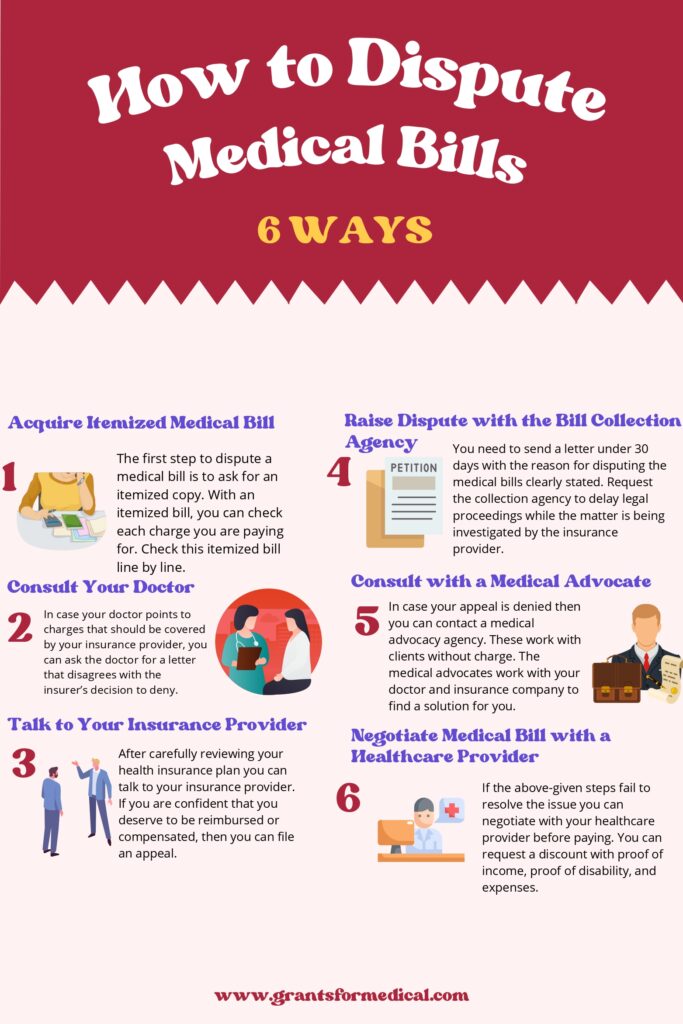How to Dispute Medical Bills – Overview
Medical bills are an unavoidable part of our lives. You, or someone in the family, may go to the doctor and come home with a medical bill.
At times, medical bills can be erroneous, with extra charges and unrequired costs added to them.
So, if you find yourself with an erroneous medical bill, then here’s what you can do to dispute it and get the error rectified.
Disputing Medical Bills

1 – Acquire itemized medical bill
Most times, clinics and hospitals provide a bill that shows the lump sum you owe. The first step to dispute a medical bill is to ask for an itemized copy.
With an itemized bill, you can check each charge you are paying for. Check this itemized bill line by line.
Make sure you have not been double-charged. Ensure that there are no coding mistakes or incorrect calculations on the bill.
Then, compare the medical bill with your health insurance plan. This shows the charges you have to pay out of pocket. It also tells you which charges the insurance policy will cover.
Make sure that you have not been charged for something that the insurance provider is supposed to pay.
Apart from this, you should wait for your insurance provider’s Explanation of Benefits report. This report details the charges for specific dates and hospital/clinic visits.
2 – Consult your doctor
If you think there’s been a calculation error in your medical bill, you can talk to your doctor, too. You can ask them to review the bill again and fix any mistakes.
If your doctor points to charges your insurance provider should cover, you can ask the doctor for a letter that disagrees with the insurer’s decision to deny.
Whenever you talk to anybody about your bills, note their name and designation, along with the date of the conversation.
Apart from this, keep a detailed summary of the decisions made during the conversations. Ensure that you deal with any issues promptly.
Most insurance providers get a 60 to 90-day window for bill payment. However, your credit score may be affected if you don’t pay within the stipulated timeline.
3 – Talk to your insurance provider
You can talk to your insurance provider after carefully reviewing your health insurance plan. If you are confident you deserve to be reimbursed or compensated, you can file an appeal.
This needs to be done quickly, preferably between 30 to 60 days from receiving the medical bill.
Ensure to include your medical records, the letter from your doctor disagreeing with the insurance company’s decision, and any other important relevant document.
Once again, keep a detailed record of the person you speak to, their designation in the company and the decision made after each conversation.
4 – Raise a dispute with the bill collection agency
In case the unpaid medical bill is sent to a collection agency for recovery in the middle of an appeal, then file a notice with the collection agency.
You need to send a letter under 30 days stating the reason for disputing the medical bills. Request the collection agency to delay legal proceedings while the insurance provider investigates the matter.
Always send letters by certified mail with a request for return mail. Make sure to keep a copy of the letters and receipts of postage.
5 – Consult with a medical advocate
If your appeal is denied, you can contact a medical advocacy agency. These work with clients without charge. The medical advocates work with your doctor and insurance company to find a solution.
You can check local community resources for medical advocacy agencies nearest to you. Alternatively, you can contact a disease organization for information about the best and nearest medical advocacy group.
6 – Negotiate medical bills with a healthcare provider
If the above-given steps fail to resolve the issue, you can negotiate with your healthcare provider before paying. You can request a discount with proof of income, proof of disability, and expenses.
You can also share copies of your tax records and bank statements. This way, you can get up to 20% off the bill.
If you cannot pay the required amount, you can consult with your doctor or hospital.
This way, you can get in touch with financial assistance programs aimed at helping people pay off medical bills. You may even qualify to cover part of your bill through financial aid.
Conclusion
To avoid errors and mistakes on medical bills, read the offered insurance policy documents carefully.
This way, you can avoid incurring out-of-pocket expenses whenever you can.
This also helps to avoid unwanted disputes between consumers, healthcare providers, and insurance companies.
See Also